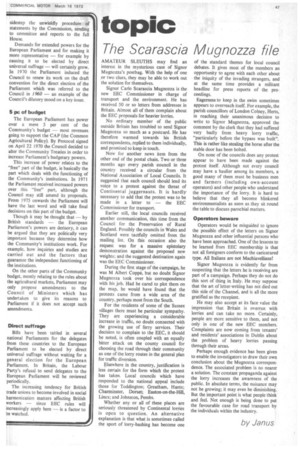topic
Page 49

If you've noticed an error in this article please click here to report it so we can fix it.
The Scarascia Mugnozza tile
AMATEUR SLEUTHS may find an interest in the mysterious case of Signor Mugnozza's postbag. With the help of one or two clues, they may be able to work out the solution for themselves.
Signor Carlo Scarascia Mugnozza is the new EEC Commissioner in charge of transport and the environment. He has received 50 or so letters from addresses in Britain. Almost all of them complain about the EEC proposals for heavier lorries.
No ordinary member of the public outside Britain has troubled to send Signor Mugnozza so much as a postcard. He has therefore warmed towards his British correspondents, replied to them individually, and promised to keep in touch.
Now for another news item from the other end of the postal chain. Two or three months ago every parish council in the country received a circular from the National Association of Local Councils. It suggested that each council should lend its voice to a protest against the threat of Continental juggernauts. It is hardly' necessary to add that the protest was to be made in a letter to — the EEC Commissioner for transport.
Earlier still, the local councils received another communication, this time from the Council for the Preservation of Rural England. Possibly the councils in Wales and Scotland were tactfully omitted from the mailing list. On this occasion also the request was for a massive epistolary demonstration against the proposed new weights; and the suggested destination again was the EEC Commissioner.
During the first stage of the campaign, he was M Albert Coppe, but no doubt Signor Mugnozza took over his correspondence with his job. Had he cared to plot them on the map, he would have found that the protests came from a wide area of the country, perhaps most from the South.
For the residents of some of the Sussex villages there must be particular sympathy. They are experiencing a considerable increase in traffic, no doubt connected with the growing use of ferry services. Their decision to complain to the EEC, it should be noted, is often coupled with an equally bitter attack on the county council for choosing the road through their community as one of the lorry routes in the general plan for traffic diversion.
Elsewhere in the country, justification is less certain for the form which the protest has taken. Local councils which have responded to the national appeal include those for Toddington; Greatham, Hants; Charminster, Dorset; Easton-on-the-Hill, Lines; and Johnston, Pembs.
Whether any or all of these places are seriously threatened by Continental lorries is open to question. An alternative explanation is that what is sometimes called the sport of lorry-bashing has become one of the standard themes for local council debates. It gives most of the members an opportunity to agree with each other about the iniquity of the invading strangers, and at the same time provides a militant headline for press reports of the proceedings.
Eagerness to keep in the swim sometimes appears to overreach itself. For example, the parish councillors of London Colney, Herts, in reaching their unanimous decision to write to Signor Mugnozza, approved the comment by the clerk that they had suffered very badly from heavy lorry traffic, "particularly before the bypass was built". This is rather like stealing the horse after the stable door has been bolted.
On none of the councils does any protest appear to have been made against the protest itself. Although not every council may have a haulier among its members, a good many of them must be business men and farmers (including own-account operators) and other people who understand the importance of the lorry. It is hard to believe that they all become blinkered environmentalists as soon as they sit round the table to discuss parochial matters.
Operators beware Operators would be misguided to ignore the possible effect of the letters on Signor Mugnozza and other influential persons who have been approached. One of the lessons to be learned from EEC membership is that not all foreigners conform to the caricatured type. All Italians are not Machiavellians!
Signor Mugnozza is evidently far from suspecting that the letters he is receiving are part of a campaign. Perhaps they do not do this sort of thing in Italy. He may suppose that the art of letter-writing has not died out this side of the Channel, and is all the more gratified as the recepient.
He may also accept at its face value the impression that Britain is overrun with lorries and can take no more. Certainly, people are more sensitive to them, and not only in one of the new EEC members. Complaints are now coming from tenants' and residents' associations in Dublin about the problem of heavy lorries passing through their areas.
Perhaps enough evidence has been given to enable the investigators to draw their own conclusion about the Mugnozza correspondence. The associated problem is no nearer a solution. The constant propaganda against the lorry increases the awareness of the public. In absolute terms, the nuisance may not be growing; it may even be diminishing. But the important point is what people think and feel. Not enough is being done to put the favourable case for road transport by the individuals within the industry.
by Janus
























































































































